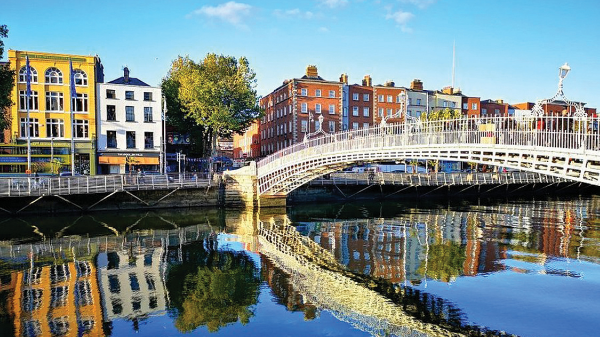
The Dublin Guide: Travel through the lure of the Irish
European capitals such as London, Paris and Rome may immediately spring to mind as preeminent contemporary cities that meld history and modernity, but Dublin, with its centuries-old cathedrals, gothic castles, bustling nightlife and hearty culture, should not be overlooked. First settled by the ancient Vikings back in 841 AD as Dubh Linn (literally ‘black pool’), it was latterly conquered by the English during the 13th century before most of Ireland gained independence in 1922.

Indeed, its tumultuous military history is well reflected in the various monuments and museums that punctuate its bounds, but these are equally matched by graceful Georgian buildings, tranquil greenery, a thriving culinary scene and, of course, the famed distilleries, not to mention the home of Guinness stout. So, whether it’s history, architecture, whisky or literature that piques your interest, here are the top sights to explore in the Irish capital.
Trinity College

A visit to Trinity College, the oldest surviving university in Ireland, is the perfect way to imbibe the country’s incredible history and cultural legacy. Founded by England’s Queen Elizabeth I in 1592, the institute sits on a sprawling 40-acre estate replete with cobbled squares, secluded gardens and pristine parks that are fantastic for whiling away a sunny afternoon with a picnic lunch.
Antiquarians should not miss the guided student tours of the Old Library, which boasts a veritable treasure trove of ancient artefacts. Key among these is the Book of Kells – a stunning ninth-century calfskin manuscript detailing the life of Jesus Christ – considered by many to be Ireland’s most important historical work. As the building receives plenty of foot traffic, particularly during the peak season, skip the long queues by booking your tour online.
Dublin Castle

Built upon what was once an ancient Viking settlement, Dublin Castle has long been the epicentre of political, commercial and social activity in Ireland. Constructed by decree of England’s King John in 1204, it was the heart of English, then British rule for nearly seven centuries before finally being relinquished to local authorities following the formation of the Irish Free State in 1922. Over the course of its history, it has worn many faces – as a medieval fortress, royal court and government administrative building.

Today, it takes visitors on an in-depth journey through Ireland’s dynamic history, beginning with the subterranean Viking chambers and the surprisingly well-maintained Medieval Tower to the state apartments of the viceregal court and much more besides. In particular, it’s well worth a side trip to the Chester Beatty, a library and museum that permanently houses the expansive collections of US mining magnate Sir Alfred Chester Beatty.
Kilmainham Gaol

For an equally fascinating – if slightly more sombre – historic experience, look no further than Kilmainham Gaol. Completed in 1796, this forbidding jail gives an intimate glimpse of the history of Irish nationalism and struggle for independence. In fact, it imprisoned (and executed) countless notorious revolutionaries, including the leaders of the 1916 Easter Rising insurrection.
Today, there are any number of tours on offer that provide a compelling narrative of this bleak structure – which shuttered prisoners until 1926 and is now a museum – be it outlining the struggle for Irish independence or detailing the morbid living conditions of its former inmates. For those with a blood-thirsty bent, head to the Stonebreakers’ Yard – the spot where the aforementioned insurrectionists met their grisly fate.
St. Stephen’s Green

The expansive 22-acre St. Stephen’s Green is a tranquil oasis nestled at the heart of Dublin’s hustle and bustle. Boasting manicured lawns, a duck pond, water features and a children’s playground, the location provides a pleasant contrast to the plethora of urban sights. Just a short stroll away from the bucolic green is Grafton Street, home to some of the best shopping in northern Europe. Should you be inclined to indulge in more learned explorations than a hotspot for retail therapy, just to the south of the park lies the Museum of Literature Ireland, an institute that highlights the nation’s immense storytelling legacy.
Jameson Bow Distillery

For the Irish whisky aficionado, there are not one but two quintessential distilleries to be found within Dublin’s acreage. The first and undoubtedly more famous is the Jameson Bow St. Distillery. Though the tipple is no longer made on site – it is now produced in Cork – the factory-turned-museum inhabits the original building where the brand was founded by John Jameson in 1780. Among its many offerings are distillery tours, whisky tastings and even learning to blend your own.
Teeling Distillery

Teeling Distillery, meanwhile, which lies a scant 10-minute drive away, offers a less frenetic, more laidback experience. Debuting in 2015, it was the first whisky distillery to open in Dublin in more than 125 years. Yet, despite its relative youth, the company has managed to rake in some 300 international awards for its various products, several of which are on offer with its whisky tasting experiences.
Guiness Storehouse

No visit to Dublin would be complete without entering the centre of one of its most popular exports – Guinness. Even if you’re not an imbiber, the vast, multistorey Guinness Storehouse – which served as the brewery’s fermentation plant for 86 years – educates on every aspect of the famed ‘black stuff’, from the four ingredients that serve as its base (barley, hops, yeast and water) to the background of the family that started the now-international phenomenon to pouring a pint of Guinness the right way.
Wrap up your trip in memorable fashion by downing a glass of the distinctive dry stout (included with the price of admission) at the top-floor Gravity Bar, whose floor-to-ceiling windows also afford some of the best panoramic views of the city. Sláinte!
(Text: Tenzing Thondup)







